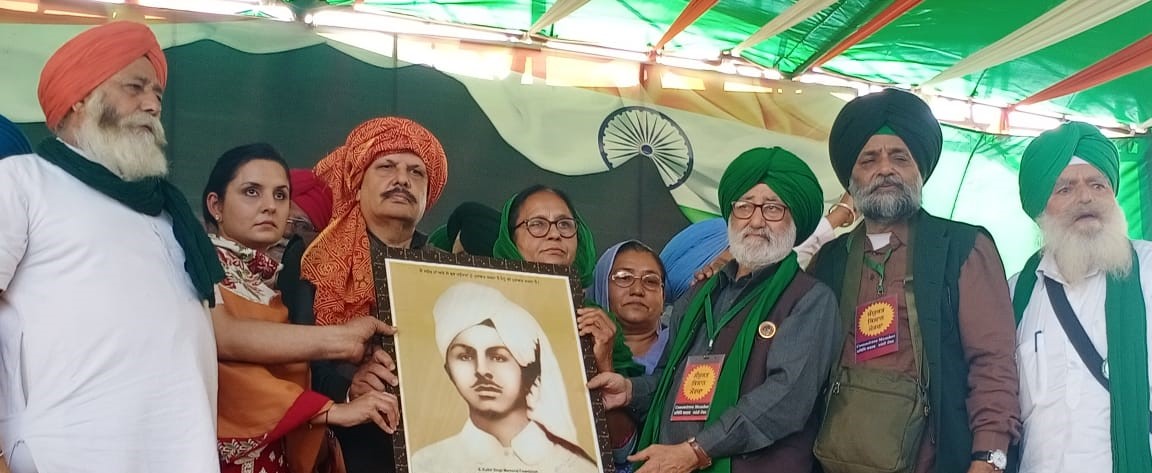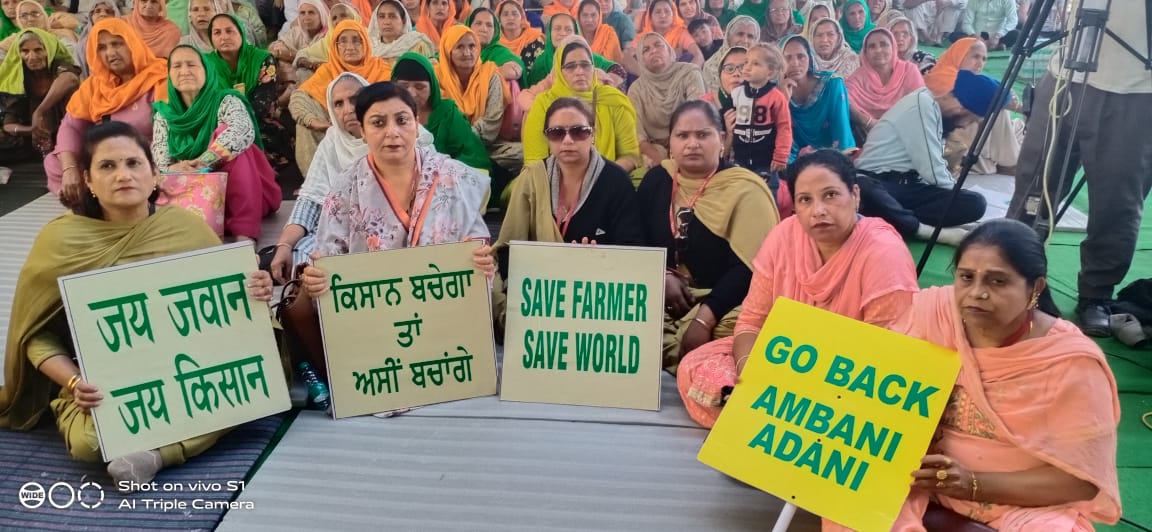
'Pagdi Sambhal Jatta': Farmers revive a British-era movement to fight Centre
The agitating farmers at the three Delhi borders have revived a century-old ‘Pagdi Sambhal Jatta’ (Save your Turban) movement, in their ongoing protest against the Central government, on the 140th birth anniversary of the movement's founder, Ajit Singh, which falls on February 23.

The agitating farmers at the three Delhi borders have revived a century-old ‘Pagdi Sambhal Jatta’ (Save your Turban) movement in their ongoing protest against the central government, on the 140th birth anniversary of the movement’s founder, Ajit Singh, on February 23.
Ajit Singh had spearheaded the ‘Pagdi Sambhal Jatta’ movement in 1907 in protest against the anti-farmer laws enacted back then by the British rulers. Just like the current Central government, the British colonial government too had brought in three laws against the Punjab farmers in the first decade of the 20th century. The first was the Punjab Land Colonisation Bill, which introduced inheritance by primogeniture, threatening farmers’ land with seizure, as they are fear today.
The second was the Bari Doab Canal Act, by which water rates were increased, and a 25% hike in revenue rates was effected; and the last one was Punjab Land Alienation Act. Between March and May 1907, several meetings were held in various cities of Punjab to oppose the three laws.

On March 22, 1907, during a meeting held at Lyallpur, Lala Banke Dayal, editor, Jhang Syal, recited his poem, Pagdi Sambhal Jatta, now regarded as a classic. Subsequently, the farmers named their agitation after the evocative poem — Pagdi Sambhal Jatta movement.
Also read: Nails on roads, Twitter ban, trains diverted to stop farmers’ agitation
Lord Morley, secretary of state for India, told the British Parliament that in all, 33 meetings against the bills were held in Punjab, of which Ajit Singh had addressed 19 as the main speaker. Fearing massive protests and demonstrations, the British government revoked the bills in May 1907.
Ajit Singh, the uncle of Shaheed Bhagat Singh, was born on February 23, 1881, in Khatkar Kalan village (then in Jalandhar district). Arjan Singh, the father of Kishan Singh (Bhagat Singh’s father), Ajit Singh, and Swarn Singh were all staunch nationalists.
Remembering the hero of the ‘Pagadi Sambhal Jatta’ movement on his birth anniversary, Darshan Pal, president of the Krantikari Kisan Union, told The Federal that like Sardar Ajit Singh, who did not back down until the British laws were repealed in 1907, they, too, will not go back until the three farm laws are abolished. The Sikhs can give their lives for their pagadi (turban), he said.
Current regime worse than the British
Meanwhile, Pushpendra Singh, a farmer from Moga in Punjab said, “We will not let our turbans fall. We will make this government repeal the three farm laws. We won’t give up our dignity and respect. We are descendants of Shaheed Bhagat Singh and Ajit Singh.”
“It is deplorable that if the agitation had been against the British, we would be nationalists and if it is against Modi, we are considered as anti-nationals. We are the biggest nationalists, and we have lost our people to build this nation, and now the BJP says that we are Khalistanis and anti-nationals,” said Rajinder Singh, a farmer from Ludhiana in Punjab, who added that they will not budge from the protest site.

Family members of Shaheed Bhagat Singh, including Abhay Sandhu, Teji Sandhu, Anuspriya Sandhu, and Gurjeet Kaur, also attended the Pagadi Sambhal Jatta revival by the farmers on Singhu Border.
Also read: Saka Nankana Sahib centenary inspiring protesting farmers to keep fighting
Talking to The Federal, Abhay Sandhu, Shaheed Bhagat Singh’s nephew said, “No one is more nationalist than the farmers of a country. They love their land and feed others. It is very unfortunate that the farmers have to prove their nationalism. Governments will come and go but the farmers will be there.”
Sandhu added, “The farmers sitting on the borders are not only farmers, they are the farmers who made India. They are the descendants of Shaheed Bhagat Singh. They gave their lives to this country. It really hurts when we see these farmers having to prove their nationalism. If Bhagat Singh or Ajit Singh had been alive, they would have felt really bad.”
Manjit Singh Dhaner, vice-president, Bhartiya Kisan Union Dakunda, also told The Federal that the Britishers even accepted the farmers’ demands back then and repealed it. “But this government is so adamant that they are not listening to their own farmers. This means this regime is worse than the British one. The protest will go on till our demands will be met,” he pointed out.
When asked if the number of protesters was dipping at the borders, Dhaner said, “You can see for yourself. Have you seen the mahapanchayats that happened in Punjab, Haryana, and western UP? More than 2 lakh farmers attended each mahapanchayat. Today, in the Pagadi Sambhal Jatta event, there were more than 3 lakh farmers.”
According to Dhaner, some farmers had to rush back because of the harvesting season, and also some went back for the mahapanchayats. “Everyone is back now. We believe there are 8 lakh farmers collectively across the three borders. This is a fake narrative by the government and media channels to make the protest weak but they will not be successful,” added Dhaner.
Ajit Singh’s role in independence and farmer’s protest
In 1906, soon after college, drawn to the freedom movement, Ajit Singh and Kishan Singh started attending the Congress sessions at Calcutta, presided over by Dadabhai Naoroji and sided with Bal Gangadhar Tilak in Congress. Returning to Punjab, they formed the Bharat Mata Society, which was called Anjuman-i-Mohabban-e Watan in Urdu.
Also read: Farmers to escalate protest, plan new strategies
In 1907, Ajit Singh built up a popular mass resistance to the farm laws introduced by the Britishers. Congress failed to lead this movement, arguing that the Bill had already been passed as a Law. It was then that the peasants accepted the leadership of Ajit Singh and his Bharat Mata society, which was waging a fearless resistance against the anti-peasant laws.
In no time, Lahore and its neighboring areas witnessed a veritable wave of rallies, demonstrations, and mass conventions attended by thousands of people. The meetings discussed these repressive laws as well as the true picture of a nation ravaged by British colonialism and ended with a rousing call for an all-out rebellion against foreign rule.
Ajit Singh was a powerful orator who used to hold the audience spellbound. One of his speeches, delivered on April 21, 1907, at Rawalpindi, was described as ‘highly seditious’ by British officials, and a case under Section 124-A (sedition) of the IPC was registered against him.
Ultimately, the three laws were revoked in May 1907, but Lala Lajpat Rai, also a speaker at some of these meetings, was arrested on May 9 and Ajit Singh on June 2. Both were deported to the Mandalay prison in Burma for six months. Both were released on November 11, 1907.
Also read: Punjab, Haryana farmers protest Centre’s ordinances. This is why
Meanwhile, Ajit Singh’s nephew Bhagat Singh was born on September 28, 1907. In December 1907, Ajit Singh and Sufi Amba Prasad attended the Congress session at Surat, where Tilak presented Ajit Singh with a taj, crowning him ‘the king of Punjab peasantry’.
Fearing that he could be arrested again in a false case, Ajit Singh left for Iran from Karachi by ship. Ajit Singh, under the pseudonym of Mirza Hassan Khan, stayed until 1914 in Iran, Turkey, France, and Switzerland before reaching Brazil, where he spent 18 years (1914-32).
From 1932 to 1938, he remained in Europe — mostly in Switzerland. Bhagat Singh’s reportedly last wish — before he was executed in 1931 — was that his uncle may not be allowed to die in a foreign country.
Ajit Singh’s life in exile is a long story. In Italy, he created Azad Hind Lashkar of 11,000 army men and met Netaji Subhas Bose there on foreign soil. After the fall of Italy, Ajit Singh was imprisoned and kept in an Italian jail, and later, when the Germans surrendered, he was shifted to a jail in Germany. Finally, due to the intervention of Jawaharlal Nehru, who had become interim Prime Minister of India, Ajit Singh was released from a prison in Germany.
He returned to India on March 7, 1947, after spending two months in London with Indian nationalists while recuperating from ill-health. In Delhi, he was a guest of Nehru. On his return to Lahore on April 9, he was given a tumultuous welcome. In view of his bad health, he went to the hill station of Dalhousie in July 1947.
On the intervening night of August 14-15, 1947, after listening to Nehru’s Tryst with Destiny speech, he felt overwhelmed and after saying “Jai Hind”, breathed his last at around 3:30 am in free India.

